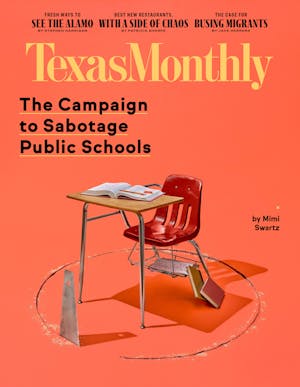Specialization is often a requirement for excellence, in fields ranging from engineering to medicine. Those focusing on a niche such as, say, pediatric heart surgery, have a better chance of becoming a top physician. Many magazine writers similarly develop expertise in a specific area. I’m proud to work alongside several authorities on topics such as energy, barbecue, and tacos. But in journalism, as in medicine, the gifted generalist also plays a vital role. And one of the best in Texas is our senior executive editor Mimi Swartz.
Mimi writes about whatever engages her curiosity—including state politics, fashion, and profiles of all sorts of fascinating characters. For our March cover story, she reported on the escalating campaign by certain right-wing activists and politicians to undermine public schools in Texas. She’d been discussing the topic for months with features director J. K. Nickell, a former public school teacher with two young children who works out of our Dallas office. They were trying to find a relatable character through whom to tell a complex tale. Luckily, Brian Standefer, the multimedia producer who helps shepherd our podcasts, introduced Mimi to Joanna Day.
A former attorney turned full-time mom, Day had, at considerable sacrifice, served on the school board in the Austin exurb of Dripping Springs, only to find herself subject to character assassination and harassment. “It’s a nightmarish example of the damage these anti–public school activists are capable of,” J.K. says. “But even more alarming is how routine this is becoming across the state.”
Also in the March issue, Mimi has penned the first in a series of articles in which we look back at signal events over the past half century, to mark Texas Monthly’s fiftieth anniversary year. Her piece examines the 1977 killing by six rogue police officers of José Campos Torres, a young Army veteran born in Houston to Mexican American parents. Mimi describes how the Latino community’s response to his killing has, over the decades, spurred the city to improve the quality and accountability of its policing and to commit to achieving more progress. “I had just moved to Houston a year before Torres was killed, when the population and the police department were a lot less diverse,” she recalls. “It was quite a different city from the one that last year announced it would build a memorial to Torres.”
Mimi grew up in San Antonio, where her mother’s family had settled just a few years after the Battle of the Alamo. A pair of exceptional public school teachers inspired Mimi’s love of writing. That led her to Hampshire College, in Massachusetts, where she met, among others, an undergrad named Ken Burns. (“He had,” she recalls, “the same haircut then that he has now.”) Her first job was as a paralegal in Houston, but she wrote freelance stories for local publications and soon went to work full time for the now defunct Houston City magazine. She joined Texas Monthly in 1984. Her writing for us has won two National Magazine Awards, the Oscars of our industry. Her stories for the magazine also inspired her to write two acclaimed books: Power Failure, about the Enron scandal, and Ticker, about the quest to create the world’s first artificial heart.
She left Texas Monthly for a couple of years to work for the New Yorker and Talk magazine but quickly returned after asking herself: “Why would you want to write about celebrities like Elizabeth Hurley when you could be writing about crazy rich Houston trial lawyers?” She approvingly quotes her husband, John Wilburn, also a journalist, as saying that “you can’t walk out of your front door in Texas without stumbling onto a great story.”
While she’s one of our most accomplished long-form writers, Mimi also has honed quite a short game in recent years, contributing regularly to our website. I hope you enjoy her stories there and in this issue of Texas Monthly.
This article originally appeared in the March 2023 issue of Texas Monthly with the headline “Writing the Range.” Subscribe today.









